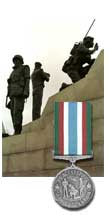| |
|
|
 |
|
CF BACKGROUNDER
DOCUMENTATION
5 June 2000
In 1988, the
prestigious Nobel Peace Prize was awarded to United Nations Peacekeepers
in recognition of their collective efforts in the cause of peace
for more than fifty years. This inspired the creation of the Canadian
Peacekeeping Service Medal (CPSM), the purpose of which is to
recognize all Canadians, including serving and former members
of the Canadian Forces, members of the Royal Canadian Mounted
Police and other police services, and Canadian civilians who contributed
to peace on specific missions. The medal has taken some time to
reach the presentation stage, but as with the creation of any
major honour or award, the approval of this award involved consultation
with a large number of interested individuals and groups.
|
| |
|
|
 |
|
THE MEDAL
The medal's
obverse features the three Canadian Peacekeeper figures that top
the Peacekeeping Monument in Ottawa. One is an unarmed United
Nations Military Observer, holding a pair of binoculars. A second
soldier, a woman, shoulders a radio, while the third stands guard
with a rifle. Above them flies a dove, the international symbol
of peace. This side of the medal also bears the inscriptions PEACEKEEPING
and SERVICE DE LA PAIX, together with two maple leafs. The medal's
reverse shows the cypher of Her Majesty the Queen on a maple leaf
surrounded by two sprigs of laurel and the word CANADA.
|
| |
|
|
 |
|
THE
RIBBON
The medal's
ribbon consists of four colours: green, red, white and United
Nations blue. The green represents volunteerism; the red and white
are the colours of Canada's flag; while the white and blue represent
the colour of the United Nations' flag, under whose auspices the
majority of peacekeeping missions have taken place since 1947.
The red and white carry additional meaning. White is associated
with purity, and peacekeeping is one of mankind's highest ideals.
Red is symbolic of the blood shed by Canada's 113 peacekeepers
who have fallen in service to their country while on peacekeeping
and observer missions. Almost
125,000 Canadians have served in peacekeeping missions over the
past 53 years, a record is unsurpassed by any nation. This tradition
"in the service of peace" continues today.
|
| |
|
|
|
|
|
ELIGIBILITY
The CPSM will
recognize service by Canadians deployed outside Canada for a minimum
of 30 days (not necessarily consecutively) either on the strength
of a unit of the Canadian Forces deployed on a peacekeeping or
observer mission, or in direct support of any such mission. This
will include members of the Royal Canadian Mounted Police, other
Canadian police officers, and civilians who served with such forces
on peacekeeping missions. As
the CPSM is a peacekeeping medal, certain service will not qualify.
This includes service in Korea from 27 June 1950 to 27 July 1953,
in the Arabian Gulf from 2 August 1990 to 27 June 1991, and in
Somalia from 16 November 1992 to 30 June 1993. Additionally, humanitarian
missions do not qualify. Holders
of the PEACE Bar to the Canadian Special Service Medal, and individuals
who have served on most United Nations and international peacekeeping
missions, are considered eligible for the CPSM. Those who do not
hold any specific medals may also qualify, if they can show that
they have supported such missions in theatre for a minimum of
30 days. The CPSM will be issued without bars or numbers, and
will also be issued for future missions. Therefore, other missions
will be added to the list of qualifying service as Canada accepts
them. A
complete list of eligible missions and instructions on how to
apply for the Canadian Peacekeeping Service Medal can be found
in the drop down menu at the top of this page.
|
|